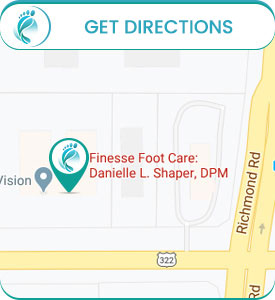Home » Lyndhurst, OH Peripheral Neuropathy Therapy Specialist
You cannot copy content of this website, your IP is being recorded
Peripheral Neuropathy Therapy Specialist in Lyndhurst, OH
Peripheral neuropathy is a disorder that affects nerves outside the brain or spinal cord, causing tingling, numbness, and burning pain in affected areas. Dr. Danielle L. Shaper, DPM, at Finesse Footcare, uses a comprehensive approach to treat this condition, which includes pain in the feet, ankles, and legs. If you are noticing signs and symptoms of Peripheral neuropathy, such as numbness, tingling, and pain, come see us at Finesse Footcare! For more information, contact us or schedule an appointment online. We are conveniently located at 5035 Mayfield Rd Lyndhurst, OH 44124.
Additional Services You May Need






